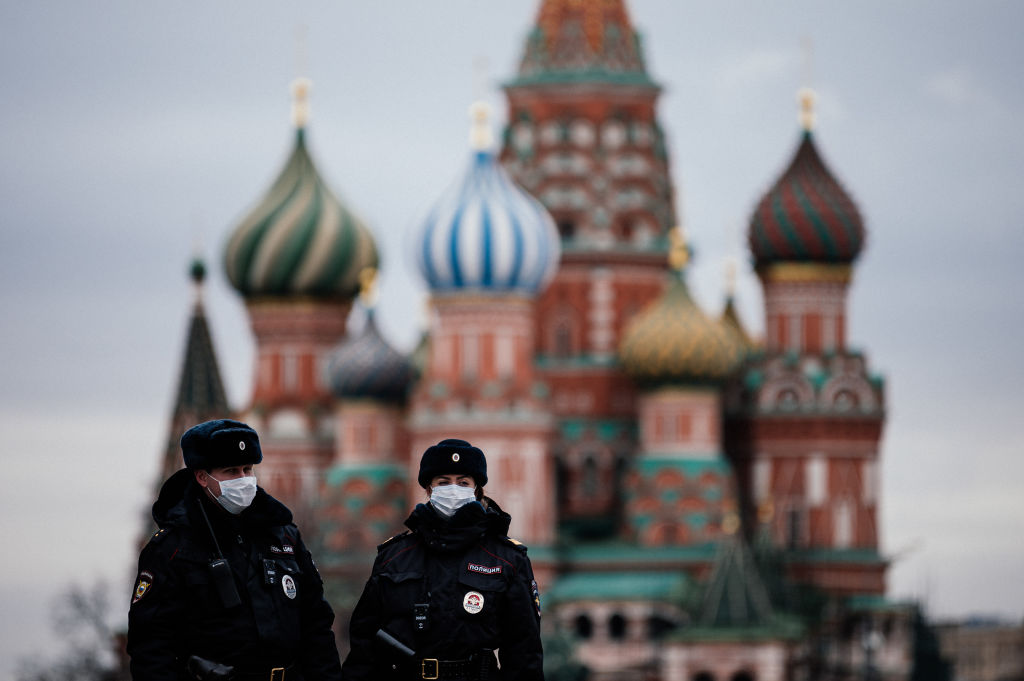Russia is having a hard time motivating people to get vaccinated


A free daily email with the biggest news stories of the day – and the best features from TheWeek.com
You are now subscribed
Your newsletter sign-up was successful
There are three widely available COVID-19 vaccines in Russia, but many Russians say they won't get a shot because they don't trust something made in their country.
Russia announced last August that it had its first vaccine, called Sputnik V, and President Vladimir Putin's daughter had been inoculated with it. Researchers have found that Sputnik V, which is also being used in Brazil and Turkey, is about 91 percent effective. Even with multiple vaccination options, only 14 percent of Russia's 146 million residents have been vaccinated with at least one dose of a vaccine, and the government will not hit its goal of getting 30 million Russians vaccinated by June.
Samyr Oynushev, 29, of Moscow told NBC News he believes COVID-19 vaccines are necessary, but will not get one made in Russia. "If I had a choice, I would rather take a non-Russian vaccine," he said. "I think that [low vaccination rates] are primarily the fault of the government, that people don't trust them so much."
The Week
Escape your echo chamber. Get the facts behind the news, plus analysis from multiple perspectives.

Sign up for The Week's Free Newsletters
From our morning news briefing to a weekly Good News Newsletter, get the best of The Week delivered directly to your inbox.
From our morning news briefing to a weekly Good News Newsletter, get the best of The Week delivered directly to your inbox.
There have been giveaways of cars and groceries to entice people into getting vaccinated, and in Moscow, bars and restaurants have been ordered to serve only people who have proof of vaccination or antibodies. Across Russia, the number of COVID-19 cases and deaths are going up — 619 people died on Saturday, the highest number since Dec. 24, and in Moscow, the highly contagious Delta variant is linked to 90 percent of coronavirus cases reported last week.
A study published in the journal Nature estimates that in St. Petersburg, about 45 percent of residents have COVID-19 antibodies, and that's another reason why many people are avoiding getting vaccinated. Epidemiologist Vasily Vlassov, infected with COVID-19 in January, is among those who said he does not feel motivated to get a Russian-made vaccine. "Russians know German cars are better than Russia's cars and they have a problem believing that a Russian vaccine is better," he told NBC News. Vlassov is now in Israel, and said he is thinking about getting the Pfizer shot before heading home.
A free daily email with the biggest news stories of the day – and the best features from TheWeek.com
Catherine Garcia has worked as a senior writer at The Week since 2014. Her writing and reporting have appeared in Entertainment Weekly, The New York Times, Wirecutter, NBC News and "The Book of Jezebel," among others. She's a graduate of the University of Redlands and the Columbia University Graduate School of Journalism.
-
 Why are election experts taking Trump’s midterm threats seriously?
Why are election experts taking Trump’s midterm threats seriously?IN THE SPOTLIGHT As the president muses about polling place deployments and a centralized electoral system aimed at one-party control, lawmakers are taking this administration at its word
-
 ‘Restaurateurs have become millionaires’
‘Restaurateurs have become millionaires’Instant Opinion Opinion, comment and editorials of the day
-
 Earth is rapidly approaching a ‘hothouse’ trajectory of warming
Earth is rapidly approaching a ‘hothouse’ trajectory of warmingThe explainer It may become impossible to fix
-
 A Nipah virus outbreak in India has brought back Covid-era surveillance
A Nipah virus outbreak in India has brought back Covid-era surveillanceUnder the radar The disease can spread through animals and humans
-
 Trump HHS slashes advised child vaccinations
Trump HHS slashes advised child vaccinationsSpeed Read In a widely condemned move, the CDC will now recommend that children get vaccinated against 11 communicable diseases, not 17
-
 Covid-19 mRNA vaccines could help fight cancer
Covid-19 mRNA vaccines could help fight cancerUnder the radar They boost the immune system
-
 FDA OKs generic abortion pill, riling the right
FDA OKs generic abortion pill, riling the rightSpeed Read The drug in question is a generic version of mifepristone, used to carry out two-thirds of US abortions
-
 The new Stratus Covid strain – and why it’s on the rise
The new Stratus Covid strain – and why it’s on the riseThe Explainer ‘No evidence’ new variant is more dangerous or that vaccines won’t work against it, say UK health experts
-
 RFK Jr. vaccine panel advises restricting MMRV shot
RFK Jr. vaccine panel advises restricting MMRV shotSpeed Read The committee voted to restrict access to a childhood vaccine against chickenpox
-
 Texas declares end to measles outbreak
Texas declares end to measles outbreakSpeed Read The vaccine-preventable disease is still spreading in neighboring states, Mexico and Canada
-
 RFK Jr. shuts down mRNA vaccine funding at agency
RFK Jr. shuts down mRNA vaccine funding at agencySpeed Read The decision canceled or modified 22 projects, primarily for work on vaccines and therapeutics for respiratory viruses
